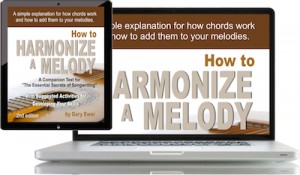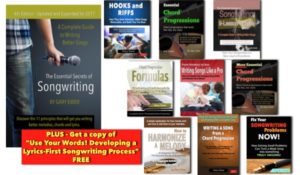In songwriting, the first notes a listener hears are vital ones. Listeners will continue with, or abandon, a song based on those first few seconds.
It’s not just pop songwriters that deal with those tricky first few seconds. It’s been a challenge for composers for centuries.
 Once you’ve got a melody, how do you know which chords will work with it? “How to Harmonize a Melody” shows you how to do exactly that. Shows the secrets of harmonic rhythm, identifying the key of your melody, chord function, and more. It’s part of “The Essential Secrets of Songwriting” 10-eBook Bundle.
Once you’ve got a melody, how do you know which chords will work with it? “How to Harmonize a Melody” shows you how to do exactly that. Shows the secrets of harmonic rhythm, identifying the key of your melody, chord function, and more. It’s part of “The Essential Secrets of Songwriting” 10-eBook Bundle.
Other creators of artistic works deal with it as well. Anyone who creates something that takes time to experience – authors, playwrights, choreographers, poets and more – they all have a similar challenge: grab the audience’s attention and keep things interesting enough that they’re willing to stick with it until the end.
If you’ve written a successful song, you’ve solved the problem of how to entice and then keep an audience listening. But because every song must be a unique experience, you’ve got to now find a new way to entice and keep your listeners.
And whatever you do, a huge part of the job will be developing the first 15 seconds or so.
It’s not unlike meeting someone for the first time. As you shake that person’s hand, you scan their face, look them in the eye, maybe even judge how they shake your hand. Do they smile? Do they use your name? Do they look at you, or look away? And you judge it all within a very few seconds.
What are the sorts of things that people judge quickly in music? What’s important?
- The mood or feel of the song (often determined by chord choice and rhythmic approach.)
- The sound of the lead singer’s voice.
- The instrumental sound.
- The initial shape(s) of the melody.
There’s no one element that gets all the responsibility. Good songs are a partnership of elements, and people will assess those elements within the first several seconds and make a judgement.
It’s not an easy thing for songwriters to evaluate the opening seconds of their own songs. You’ve got a subjective opinion, but subjectivity can blind you to how others hear your songs.
You need to develop the ability to hear your own songs as if they were written by someone else. And once you’ve achieved that ability, here are five questions to ask yourself:
- If this were someone else’s song, would you keep listening?
- Is the intro suitably interesting (chords, rhythms, mood, etc.) that it entices you to want to keep listening?
- Does the intro (or, in the absence of an intro, the first few moments of the verse) serve as a good representation of what the rest of the song has to offer?
- Are the opening lyrics drawing you in and making you want to hear what happens next?
- Can you easily answer the question, “What I like best about this song so far is___…”
Like meeting a person for the first time, the first few seconds will determine not just how they react to that song… It could determine how they react to everything else you write.
 Written by Gary Ewer. Follow Gary on Twitter.
Written by Gary Ewer. Follow Gary on Twitter.
 “The Essential Secrets of Songwriting” 10-eBook bundle includes several chord progression eBooks, including “Chord Progression Formulas”. Learn how to create chord progressions within seconds using these formulas.
“The Essential Secrets of Songwriting” 10-eBook bundle includes several chord progression eBooks, including “Chord Progression Formulas”. Learn how to create chord progressions within seconds using these formulas.











Mr. Gary Ewer,
I am Harold Daniels, my email address is danielsmusic@bellsouth.net, I am writing because I believe I purchase your material some time ago but misplaced the linkage. Would you please check and if so please send me the link to start studying again. Between broken computers and downloading information, some how I could not find the books. I did not want to repurchase the same material that I paid for thanks.
Hi Harold – No problem, I just found your purchase order, and I’m happy to resend the materials to you. The download info should be arriving in your email shortly.
Cheers,
-Gary